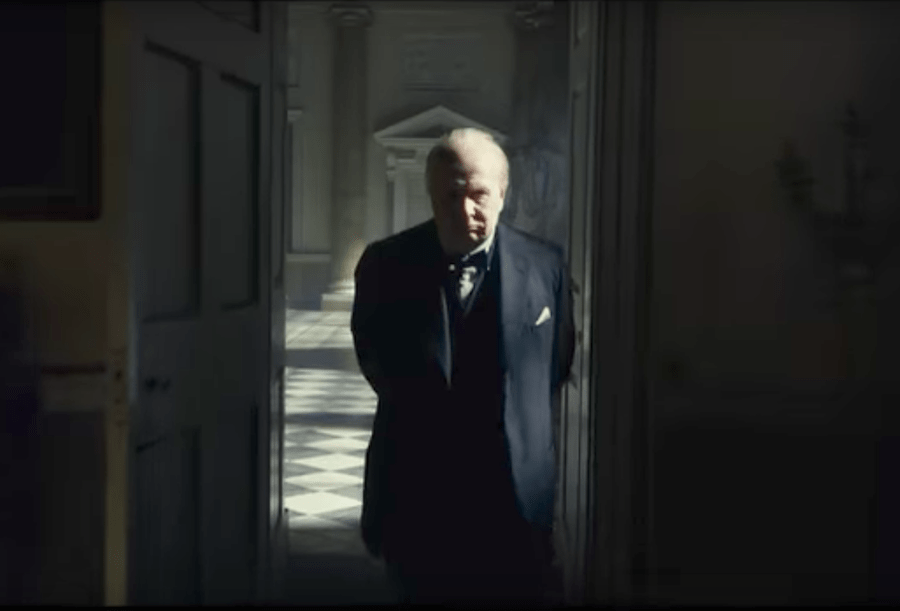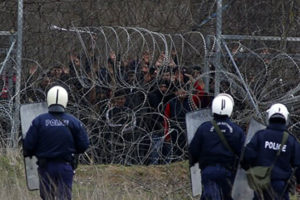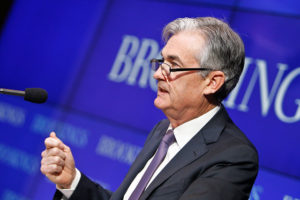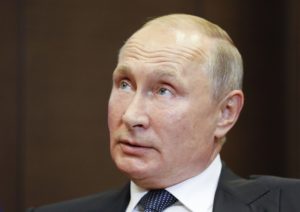Gary Oldman Excels in ‘Darkest Hour’
As Winston Churchill, the character actor delivers one of his finest performances in a movie that falls short. Gary Oldman as Winston Churchill in "Darkest Hour." (Screen shot via YouTube)
Gary Oldman as Winston Churchill in "Darkest Hour." (Screen shot via YouTube)
Perhaps it’s a lack of leadership in our own era that has filmmakers and audiences revisiting the bold and brilliant oratory of Winston Churchill. How else to account for the Netflix series, “The Crown,” starring John Lithgow, as well as “Churchill,” starring Brian Cox, in theaters last spring. Opening Wednesday is “Darkest Hour,” with Gary Oldman stepping in as the blustery British bulldog who beat the odds in taking on a Nazi war machine that laid waste to Europe.
Director Joe Wright’s new movie narrows its focus to a few turbulent weeks in the spring of 1940, when Parliament and King George VI reluctantly elevated the 65-year-old Churchill to replace the cancer-stricken Neville Chamberlain (Ronald Pickup—stepping in for the recently deceased John Hurt).
With Churchill’s failure at Gallipoli in 1915 still fresh in their memory, his eccentric behavior and unquenchable thirst for whisky hardly endeared him to his peers. But his past as a member of both the Liberal and Conservative parties at different times earned him disgruntled bipartisan support.
Wright’s camera first finds Churchill with a match to his cigar, briefly illuminating his features in a dark corner of his chamber. Breakfast is served—fatty pork, eggs, champagne and whisky. “How do you manage drinking during the day?” he is asked. “Practice!” he drolly responds. It’s just one of many bon mots featured in the screenplay by Oscar nominee Anthony McCarten (“The Theory of Everything”), one he likely gleaned from research. In fact, much of the best writing in “Darkest Hour” flows from the pen of Churchill himself, including such greatest hits as his “Victory” speech, his first as prime minister, as well as his “Finest Hour” speech, delivered in June 1940.
By condensing the time frame to a few short weeks, McCarten ratchets up the tension in a primarily dialogue-driven film that serves as an entertaining history lesson but grows tedious over its 125-minute running time. Budget issues are evident in the limited number of enclosed locations, notably the warren of hallways and chambers beneath the Palace of Westminster, as well as the House of Commons, where Wright’s drone camera dips and soars with no discernible narrative purpose. In fact, “Darkest Hour” might be best suited to the stage, with verbal eloquence and first-rate performances constituting its finer points.
Oldman began his career playing another brilliant British statesman, albeit of a different stripe—Sid Vicious in 1986’s “Sid and Nancy.” His expansive range is illustrated in subsequent performances, including his portrayal of playwright Joe Orton in “Prick Up Your Ears” and the sanguinary count in Francis Ford Coppola’s “Dracula.” In recent years, he has been relegated to supporting parts, such as Commissioner Gordon in “The Dark Knight,” but in “Darkest Hour,” Oldman reminds audiences of his magnetism, interpretive powers and leading-man gravitas.
He is surrounded by a top-notch cast, including young Lily James as Churchill’s assistant, Elizabeth Layton; as well as Ben Mendelsohn as King George and Stephen Dillane as the self-important Viscount Halifax, usurped by Churchill for the vacated prime minister’s seat. In McCarten’s semi-ripened screenplay, these characters exist primarily as abettors and foils with scant inner life of their own.
The most egregious example of this is in Kristin Scott Thomas’ portrayal of Churchill’s wife, Clementine. Best known for such movies as “Four Weddings and a Funeral” and “The English Patient,” Thomas is a vibrant and gifted actor who elevates every movie she appears in. Unfortunately, she is given little to do here, her expressive gifts squandered.
Without the backing of the U.S., England faces insurmountable odds against the Nazis. In his war Cabinet, Churchill keeps his friends close but his enemies closer, recruiting Halifax and Chamberlain who, with King George’s backing, furtively push for a deal with Hitler, foolishly believing he will remain true to his word. Churchill sets them straight: “You cannot reason with a tiger when your head is in its mouth!”
An episode that looms large in British history is the evacuation at Dunkirk, which most Americans first heard of over the summer with the release of Christopher Nolan’s movie of the same name. In Wright’s Oscar-winning “Atonement” from 2007, he staged a logistics-defying single-take steadicam shot charting the bloody beach where roughly 338,000 Allied soldiers were trapped by Nazi forces. In “Darkest Hour,” we only hear of the predicament as appeasers give up on the stranded soldiers, only to be overruled by Churchill, who orders up a flotilla of private vessels to sail the narrow channel and effect a rescue. The unlikely mission stands as a testament to the power of bold thinking, sheer will and a healthy dose of serendipity.
But the movie’s hokiest nadir comes at a critical juncture, as Churchill is on his way to delivering the climactic “Victory” speech that would dispense once and for all with the notion of appeasement. With his private car unavailable, he takes to London’s subway, where he consults with everyday Brits on the merits of appeasement. Emboldened by their rejection of the notion, he delivers his speech with undiluted conviction, setting the course for future victory. It’s an odd scene that lacks both subtlety and, even worse, an ounce of emotional or dramatic veracity.
It would be inaccurate to say it’s emblematic of what’s wrong with the movie. A history lesson for many and an acting clinic for most, “Darkest Hour” features an outstanding cast and inspirational themes, some of the elements of good cinema. What it lacks are dynamic editing, compelling shot selection and storytelling that places imagery above the spoken word.
Your support matters…Independent journalism is under threat and overshadowed by heavily funded mainstream media.
You can help level the playing field. Become a member.
Your tax-deductible contribution keeps us digging beneath the headlines to give you thought-provoking, investigative reporting and analysis that unearths what's really happening- without compromise.
Give today to support our courageous, independent journalists.








You need to be a supporter to comment.
There are currently no responses to this article.
Be the first to respond.